We’re pleased to publish a translation of an article from the German newspaper, ak: a newspaper for left debate and practice. The article is a fairly detailed report about a gathering of socialists, trade unionists, anarchists and feminists from various, mostly European, countries held in Lviv, Ukraine, in early May.
—The Editors
Leftists in Ukraine want an international exchange—what else do they want? A visit to socialists, anarchists, trade unionists and feminists in Lviv.
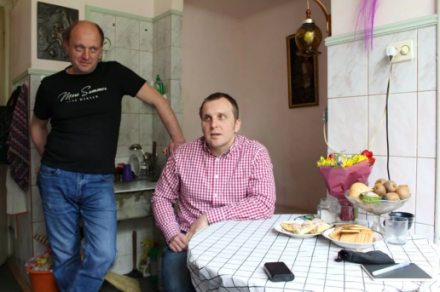
Vitaly Dudin (seated), chairman of Sotsialnyi Rukh, criticizes the limitation of labor rights under martial law. The railway unionist Aleksandr Skiba wants to “rouse up” Russian soldiers. Photo: Jan Ole Arps
On a mild spring evening, the sirens howl over Lviv. We are standing in front of a bar in the center of the city, where we have just had a beer with Swiss Trotskyists, British trade unionists and activists from the small left-wing scene in Ukraine. It’s getting dark, but the streets and squares are still full of people. Most ignore the air alert. “It is very important that this internationalist delegation trip takes place. It’s really important to us,” says Vitaly Dudin, one of our hosts and head of the left-wing organization Sotsialnyi Rukh (Social Movement), whose roughly 100 members are spread across a handful of cities. “We see ourselves as internationalists and we really miss the exchange with leftists from other countries.”
Lviv, not far from the border with Poland and traditionally a stronghold of Ukrainian nationalism, is currently one of the safest places in Ukraine, even if on the day before, three substations were hit by Russian missiles very close by. Around 200,000 internally displaced persons from all parts of the country have sought protection in the city in recent months. But there are also hundreds, if not thousands, of journalists from all over the world staying here. On the day of our arrival, the us actress Angelina Jolie is in town; on the day of our departure Bono is to come; ngo employees and politicians are shaking hands. But although Lviv and now also Kyiv can hardly save themselves from foreign visitors, since the beginning of the Russian invasion on February 24, what actually seems so obvious has not happened: that a delegation of left-wing activists, parliamentarians and trade unionists would come to the country, which Ukrainian men between the ages of 18 and 60 are no longer allowed to leave, to meet local trade unionists and social movement activists.
That would be obvious, because it is a basic idea of left-wing internationalism to process what is happening in the world in a joint discussion, across borders, and to develop positions on it. It should also be natural to stand with the working class and oppressed struggling in a country where being leftist is not easy and being invaded by an imperialist state. Ukrainian leftists, as well as leftists from other Central and Eastern European countries, have already written a number of letters, threads and texts addressed to the western left and have expressed their need for exchange, contact, networking and solidarity in a variety of ways. Hardly anyone has written back so far.
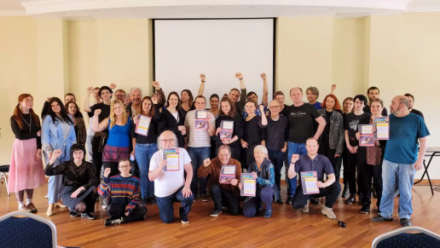
No left-wing conference without a group picture: participants from the European Solidarity Network with Ukraine and the hosts from the Ukrainian left. Photo: Jan Ole Arps
Now around two dozen trade unionists and socialists from nine European countries and Argentina have accepted the invitation of the European Solidarity Network with Ukraine, a spontaneous association primarily from the Trotskyist spectrum. The tour group is led by Hanna Perekhoda, a young woman from Donetsk who lives in Lausanne. A few members of parliament are also present. Søren Søndergaard, who sits in the Danish parliament for the red-green Enhedlisten; the Finnish mp Veronika Honkasalo from the Left Alliance that is involved in the government there; Paulina Matysiak from the Polish Left Party Razem; and Stefanie Prezioso, mp from Ensemble à Gauche in the Swiss House of Parliament. Likewise, Mireille Fanon-Mendès-France, President of the Fondation Frantz Fanon Internationale, named after her father. You could say it’s pretty late for a trip like this, more than two months into the invasion. You could say: There are quite a few, considering that Western Europe is close and big and leftists there usually have many opportunities to travel. You could say: There are far more prominent leftists than those who came here. But Vitaly Dudin says: “For us, this is a giant step.”
Are aid supplies ending up on supermarket shelves?
Dudin is an employment lawyer and earns his living in the communications department of a public authority. He also advises workers on how to assert their rights and unions on how to counter unionbusting. For these days at the beginning of May, he came to Lviv from Kyiv. Others have also made their way to the city near the border to attend the two-day conference organized by Sotsialnyi Rukh and the European Solidarity Network. The activists and trade unionists come not only from Kyiv, but also from Uzhgorod in Transcarpathia, in the very west of Ukraine, where Russian rockets also hit the day before, or from even more distant places such as Kharkiv, Mariupol, Dnipro or from the Crimea. Many of them now live as internally displaced persons in Lviv.
The war has turned the lives of everyone present upside down and determines their political work. This becomes clear when trade unionists report on the first day: Engine drivers like Aleksandr Skiba from Kyiv are now transporting refugees or humanitarian aid across the country. However, the aid supplies that come to Ukraine in large quantities do not always end up with the people, but often on the shelves of large supermarkets. “We have not yet been able to prove that the aid got there illegally, we contacted the local authorities but received no answer,” says Skiba.
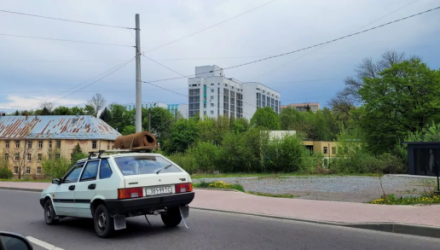
There is a curfew in Lviv between 11 pm and 5 am. During the day life goes on as normal. Photo: Jan Ole Arps
It’s not the only problem Skiba and his union, the Free Union of Railway Workers (vpzu), are currently struggling with. Many colleagues have lost their homes due to bombs and shelling. Getting aid payments is difficult: “The state pushes everything onto local authorities, but they probably don’t have the money for it. So the government will say they did everything and the local authorities will say they have no money because the government didn’t give them any.” Skiba wants to fight the authorities to get support for his colleagues. Myroslava Kaftan from the Independent Miners’ Union of Ukraine from Chervonograd near Lviv also reports on the assumption of state tasks in caring for refugees, some of whom trusted the union more than the state.
A state that, despite all the promises made by President Volodymyr Zelensky, who was elected by a large majority in 2019, has not been able to improve the living conditions of most people in recent years. Vitaliy Dudin reports that employees are often not paid their wages, which are often very low anyway; employers owe a total of 4 billion hryvnia (around 140 million euros) to “their” employees, with half of these wage debts affecting the public sector and state-owned companies. The previously miserable conditions would of course have been drastically worsened by the new war, explains Dudin.
Political parties
In addition, martial law and the recently enacted Law No. 2136 now apply. Many rights of workers that existed at least on paper have been suspended, for example the right to regular wages. Strikes have been rare in recent years, but are now completely banned. Controls of workplaces by the state labor inspectorate no longer take place.
Before the war, Sotsialnyi Rukh opposed the Zelensky government’s policy of deregulation. Now the group criticizes the restrictions imposed by martial law and the lack of a welfare state, which makes it even harder for those who already have little. It is necessary to take up the fight against the powerful oligarchs and tackle radical social reforms, such as the nationalization of the most profitable and strategically important companies and taxing the rich. The activists also emphasize that a “haircut” is urgently needed, and they are demanding that their government stop servicing the foreign debt.
Denis Pilash, also from Sotsialnyi Rukh, explains that there is opposition to the government on social and democratic issues. The group not only oppose restrictions on workers under martial law, but also criticizes the bans imposed on a number of parties. Most recently, in mid-March, eleven organizations were banned from their activities for the duration of the state of war for the duration of the state of war, including smaller groups, but also the Union of Left Forces and the opposition Platform for Life, which has 44 seats in parliament. For the most part, these parties are in the tradition of the left and labor movement in name only, Pilash explains. In fact, they are pro-Kremlin, nationalist and reactionary organizations using socialist and communist symbolism. State prohibitions and repression are not the right way—also because measures and the criminalization of socialist symbols always threatened to be directed against the left. The activists reject any discrimination based on language, origin or nationality, as well as the decommunization law passed in 2015, which bans “totalitarian symbols,” including Soviet symbols, on the basis of equating communism and National Socialism.
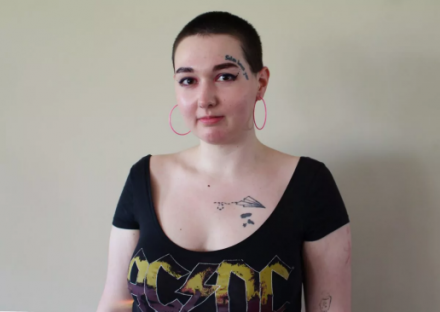
Defending Ukraine is also about not falling under a homophobic regime, says Ksenia from Queer Lab in Lviv. Photo: Sebastian Bähr
Despite all the criticism leveled at the government, they are united in defending themselves against the Russian invasion. The alternative would be a Russian occupation of the country—a catastrophe from the point of view of all our interlocutors. For the left gathered in Lviv, there is simply no alternative to defending Ukraine militarily. Activist Ksenia from the Queer Lab collective says that in some cities occupied by Russian troops, well-known queer activists are being arrested or “disappeared.” Even if the situation for queer people in Ukraine is not at all rosy, the fear of falling under Russian occupation is huge in the community, since homophobia is also part of the state raison d’être in Russia and “homosexuality propaganda” is forbidden. Russia presented itself as the “last bastion of Christian values” in Europe, says Ksenia, on whose temple a “Satan loves you” tattoo is emblazoned. The members of their group donate half of their income to Territorial Defense. They collectively decide to which units the donations go.
Where are the pacifists?
Something like this causes uneasiness, if not rejection, among many on the left in this country [Germany—editors’ note]. Which, in turn, Ukrainian leftists do not understand. Calls from Europe, such as deserting the armed units en masse, laying down your arms immediately, driving out the invaders solely by means of pacifist methods, or conducting immediate, unconditional negotiations, make them shake their heads—at the least.
Are there no pacifists in Ukraine? In the past few months, statements by Yurii Sheliazhenko have repeatedly surfaced. The researcher lives in Kyiv and is the chairman and, according to those present in Lviv, the only member of the Ukrainian Pacifist Movement. In online videos he spoke out against the war, but also against the armed defense of the country. They gained some traction among leftists and peace activists in Western Europe: as an example of a different voice from the Ukrainian left.
“Sheliazhenko, a leftist?” Denis Pilash’s eyebrows rose when we asked him about it on the evening of the second day. “I can say two things about that: First, Yurii Sheliazhenko is a loner who has no connection to the left. He’s not someone you’d meet at left-wing events. And secondly, he doesn’t even describe himself as left-wing.” He personally can’t think of anyone from the democratic and socialist left who speaks out against armed defense against the Russian war of aggression, says Pilash. All anarchists he knows are also clearly in favor of military resistance to Russian aggression.
Serhii Movchan from the Operation Solidarity group is one of them. Anarchists and anti-authoritarians have organized themselves in the initiative, they collect donations for left-wing activists in Ukraine, for the support of refugees and those in need, for military protective equipment. Around 100 anarchists and other leftists who have joined the Ukrainian territorial forces benefit from their support. “There is no discussion, there is a consensus about the Russian invasion and the need to resist it,” Movchan confirms Pilash’s assessment. Of course, not everyone is willing or able to fight with weapons themselves—but there is agreement within the scene that the resistance of the soldiers is the most important form of defense. “If Ukraine were defeated militarily, all other forms of activism would no longer make sense, and political life as before would no longer be possible,” says Movchan. He stresses that some Ukrainian anarchists were opposed to the military, but now you have to adapt your practice to reality. Yuri Chernata, also part of Operation Solidarity, adds: “We currently don’t have the luxury of being 100 percent pacifists.”
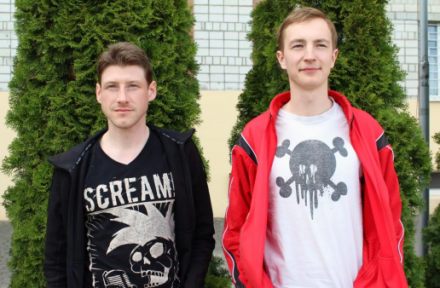
Serhii Movchan (left) and Yuri Chernata (right) from the organization Open Solidarity are collecting donations—including for protective equipment for anarchist units in Territorial Defense. Photo: Sebastian Bähr
“Some foreign leftists thought we should rather turn our arms against our rulers and start the revolution,” says Serhii Movchan with a weary smile. “Yeah, how about you guys get started? And if weapons are then also aimed at the Kremlin in Russia, we’re welcome to speak again, then we’ll definitely follow suit.”
Movchan’s bitter words bear witness to a widespread dilemma: The position of many leftists abroad can be summed up with “no war but class war” (no war apart from the class struggle)—but what does that mean in view of the mostly poor balance of power? The theoretically correct motto “The main enemy is in your own country” seems to serve as an excuse for some people not to have to enter into exchanges—even disputes—with comrades in Ukraine, whose demands for military defense and arms deliveries are not entirely comfortable.
nato’s left auxiliaries?
Positioning oneself, showing solidarity with the Ukrainian left, does not mean ignoring the numerous problems and contradictions: The danger of a further escalation of the war is real, and the fear of being used for the war goals of the nato states is also justified. There is no reason to gloss over the situation in Ukraine, as the rulers in Paris or Berlin are doing, using phrases like “freedom” and “democracy” to make the country the frontline state of their eu nationalism. The strong support among Ukrainian leftists for armed defense means its temporary integration into the structures of a state run by a neoliberal government, whose army also includes extreme right-wing units such as the Azov regiment. This extreme right could be strengthened by the war, politically and militarily. This is countered by the threat of being occupied and ruled by a repressive imperialist power. From the point of view of our discussion partners, this is clearly the greater danger at the moment.
There are no illusions among left-wing activists in Ukraine about their own government or the nato agenda. “Of course, nato has its interests in Ukraine,” says Movchan. Nevertheless: the war was started by Russia, it was not chosen. “If you’re really leftist, then listen to local people and try to understand that Ukrainians have their own subjectivity,” Movchan says.
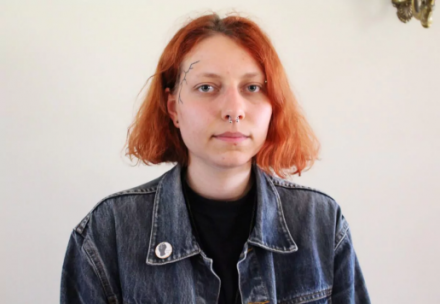
Yana Wolf from the feminist group Bilkis from Kharkiv reports that the Russian army is trying to break the population emotionally, including through targeted rapes. Photo: Jan Ole Arps
It is not the first time that the left-wing view through exclusively geopolitical glasses has resulted in ignorance and denied the subjectivity of local people, degrading them to chess pieces. Even when a workers’ uprising shook Kazakhstan at the beginning of the year, some immediately suspected an “external” attempt to curtail Russian spheres of influence and were accordingly skeptical about the insurgents. From such a point of view, Ukraine is just the battlefield where two imperialist blocs are fighting their struggle, and the people living there are condemned to passivity.
The indifference of many foreigners to the aftermath of the war hurts activists in Ukraine, especially given the gross human rights violations that have already been committed. “At first you couldn’t believe that this was real—it looked like something out of a post-apocalyptic computer game,” Serhii Movchan recalls. The anarchist visited the Bucha, Irpin and Borodyanka, places where the Russian army committed atrocities against the civilian population. In conversations with the residents, the extent of the horror became clear, he says. “It’s absurd for anyone to say the massacres were orchestrated by the cia or something. You can’t manipulate all these people in the villages, then they would all have to be actors.” In theory, he could explain how people come to such positions. “But when someone actually says something like that in a discussion, I get angry,” says Movchan.
Danger of national solidarity
But doesn’t the war harbor the danger of national solidarity between the already weak left and the government? And what about the attacks and assaults that armed militiamen committed against Roma or non-white refugees, for example?
“Yes, there are,” says Julian Kondur, a Roma rights activist from Kyiv. In early March, pictures of young Roma tied to lampposts after being accused of shoplifting went viral. “Of course, there is discrimination against us in Ukraine. For example, it is much more difficult for us to travel to the west of the country,” says Kondur. At the same time, he emphasizes that thousands of Roma fought in Territorial Defense on the side of Ukraine against the Russian invaders. “I therefore hope that our position in this country will be better after the war.”
The extreme right, which performed poorly in the last elections in Ukraine but is still a well-organized and powerful factor, is also hoping that the war will improve its position. The danger is real: what will happen if the fascist units gain combat experience and gain respect among the population? The leftists gathered in Lviv know the Ukrainian neo-Nazis. Sotsialnyi Rukh was previously unable to publicly announce events for fear of attacks. In some years, the group’s small May Day demonstrations had to be relocated from Kyiv to Kryvyi Rih because of right-wing threats. For years, those gathered here have been attacked and are also fighting against right-wing danger.
Quite a few leftists who have joined the Territorial Defense units or founded their own associations also refer to the experience of the Maidan uprising of 2014, when they had nothing to oppose the superiority of the extreme right. Back then, leftists had been chased from their squares by right-wingers or forced to put down their banners and leaflets if they wanted to remain with the protests. There was the trade-union house massacre in Odessa on May 2, 2014, when, after street clashes between nationalist football fans and pro-Russian Maidan opponents, the house where the Maidan opponents had taken refuge was set on fire; 48 people died that day. During this period, the extreme right had gained a reputation as being counted on to defend against police attacks. One of many left-wing motives is not to stand there defenseless and powerless again. Standing defenseless and powerless in the grinding mill of geopolitics is one of many left-wing motives for also arming itself this time.
“When foreigners teach you about Azov on the Internet, they are only interested in the extreme right in Ukraine, or even describe you as nationalists turned left, that is depressing,” says Denis Pilash. The socialist emphasizes that he and his comrades from Sotsialnyi Rukh see themselves as opponents of all imperialist powers. He is convinced that the fight against Russian imperialism, which they are currently forced to wage, can strengthen anti-imperialist forces around the world—while a Russian victory will further weaken the international left. Most leftists we talk to also believe that the Nazis will not benefit massively from the war. Compared to 2014, they play a minor role as a military factor today. It remains a difficult question.
Hardening and pragmatism
Friday, May 6, last day of the conference. In the block, “The Gender Dimension of War,” feminist activists and employees of women’s rights ngos report on the sexual violence that women have to endure in the course of the war. Yana Wolf, from the feminist group Bilkis in Kharkiv, who, like all other members of her group, had to flee to Lviv before the war, talks about the severe sexual violence against women in the occupied territories. Systematic rapes by Russian soldiers have been reported from many places; women become spoils of war and the known cases are only the tip of the iceberg, as such horrors are difficult to talk about. The invading army aims to subdue and emotionally break the people of the country, and that goal is being accomplished on women’s bodies, says Wolf. More violence against women is not only threatened by the aggressor; the war has also intensified patriarchal violence and strengthened traditional gender roles in Ukrainian society.
Marta Chumalo, whose ngo Women’s Perspectives offers help and advice for women in need and supports women in the labor market, confirms this. Chumalo reports a significant increase in domestic violence, not only favored by the psychological stress of the bombing and the cramped space in the shelters, but also because many men were waiting at home to be called up to become warriors who would go to the front—and whom women should be in the service of. The result is more verbal attacks and more violent behavior towards women. “War legitimizes violence, it produces men who have committed violence. We see that this discourse increases violence against women,” says Chumalo. Reporting assaults has also become more difficult. When women report such incidents to the police, they often hear that there are more important things to do at the moment; the reporting women should please come back after the war. Your organization tries to support women in need, to offer them a shelter, but the need is huge.
Abortions are also becoming more difficult, even after rape, says Yana Wolf. In Ukraine, there is actually a liberal abortion law that dates back to Soviet times. They are legal up to the twelfth week of pregnancy, and possible up to the 22nd week under certain circumstances. But women are often put under pressure by their families or by doctors not to have an abortion. The war provides the framework in which an anti-abortion discourse thrives. The appeals to women to produce offspring for the nation are increasing.
Wolf’s group also supports military defense against the Russian army. The Russian war of aggression brought death, destruction, pain, fear and psychological devastation to Ukraine, it strengthened the patriarchal, racist and ableist capitalist conditions and it had to. Wolf reports that an activist from the group has also joined the Territorial Defense Forces.
Keeping your hand outstretched in times of war remains a challenge. Yana Wolf, with a patch of the Ukrainian national colors on her jacket, answered no when asked during the conference whether her group had contact with Russian feminists. At the moment she has no desire for it. Railway union leader Aleksandr Skiba has a different perspective. “As soon as we start declaring the Russian and Ukrainian people enemies, that will bind the Russians together more for the war,” believes the train driver. There were also people among the Russian occupation soldiers who behaved decently. In addition, many are disappointed that they are being burned as cannon fodder, according to acquaintances who have spoken to Russian soldiers. If the demoralized soldiers could be more “roused up” and the truth revealed to them, there might be a way to end the war more quickly.
Skiba’s pragmatic optimism is refreshing, also in view of the hardening that can also be observed under the impact of the horrors of war. This is precisely why it would be so important to start an exchange with the comrades in Ukraine. At the same time, a left-wing antiwar policy requires that the search for opportunities for action from below not be resolved in military logic. Even if Skiba’s vision seems far away at the moment—if leftists in this country are not satisfied with bossy commentaries on the war from afar, if they do not want to sacrifice the search for left-wing internationalist politics to geopolitical thinking, then it is high time to end their passivity, overcome and socialize. At least in the Ukrainian left, the desire for this is huge.
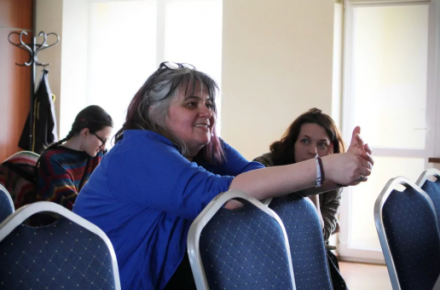
Comments
If they are supporting the imperialist proxy war against Russia in the name of “national defense” then they have crossed the class line and are not leftists.
“A ‘socialist’ who preaches national defense is a petty-bourgeois reactionary at the service of decaying capitalism.” Leon Trotsky
Spare me the safe distance revolutionary virtue bollox “comrades”! You don’t have to believe in “national defence” to fight back against someone who’s fucking you over you.
I simply want to know if IN endorses this:
“The strong support among Ukrainian leftists for armed defense means its temporary integration into the structures of a state run by a neoliberal government, whose army also includes extreme right-wing units such as the Azov regiment. This extreme right could be strengthened by the war, politically and militarily. This is countered by the threat of being occupied and ruled by a repressive imperialist power. From the point of view of our discussion partners, this is clearly the greater danger at the moment”
“Geopolitics” and “national defense” are simply ways to avoid or suppress a class analysis of this war. I don’t know how the editors of AC can reproduce this discussion without providing a single word of critical commentary. It’s, at the very least, an abdication of responsibility, given the “supra-class” class-collaborationist “issue” of a “national defense.” I remember years ago discussing “national defense” against “imperial invasion” with one of the editors of IN, telling me then, that he, and it is a he, would oppose defending Cuba against the invasion at the Bay of Pigs, so how this national defense thrust escapes analysis is a wonderment.
“When the tocsin sounded, international obligation was swept away, or forgotten, and in the frenzy aroused by the military clackers, thousands of socialist party members became the intensest of nationalists and ‘patriots,’ utterly denying their international principles and obligations and turning traitors to the movement.” Eugene Debs
Just need an answer to the question:
You are a member of Ukraine’s parliament: Do you vote for war credits?
You are a member of Russia’s Duma: Do you vote for war credits?
You are a member of the US’s Congress: Do you vote for aid to Ukraine?
Well DSA darling AOC did exactly that! $40 billion for war. Now that’s what I call Communist Theory and Practice!
Hey Paul. If you want to “fight back against someone who’s fucking you over you,” start with your own bosses!